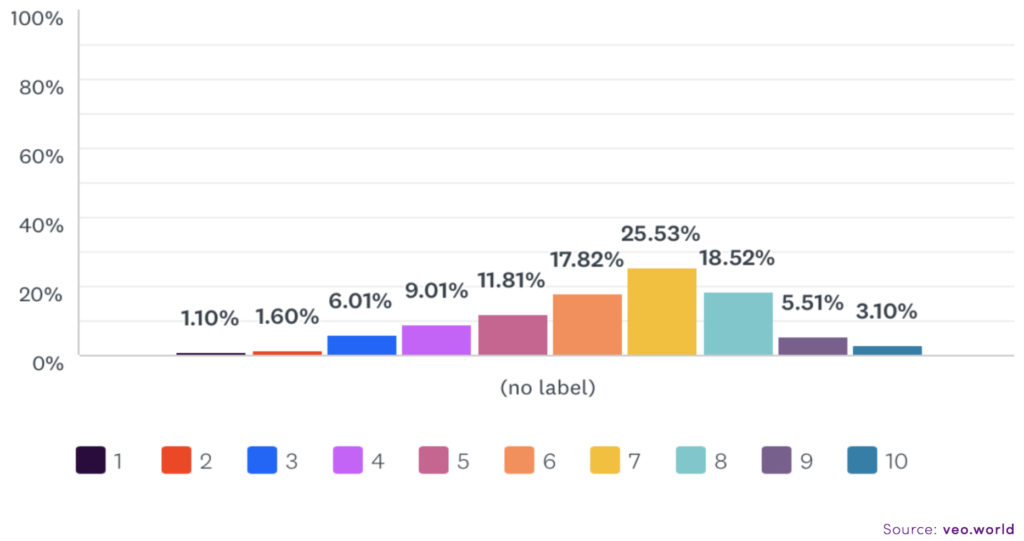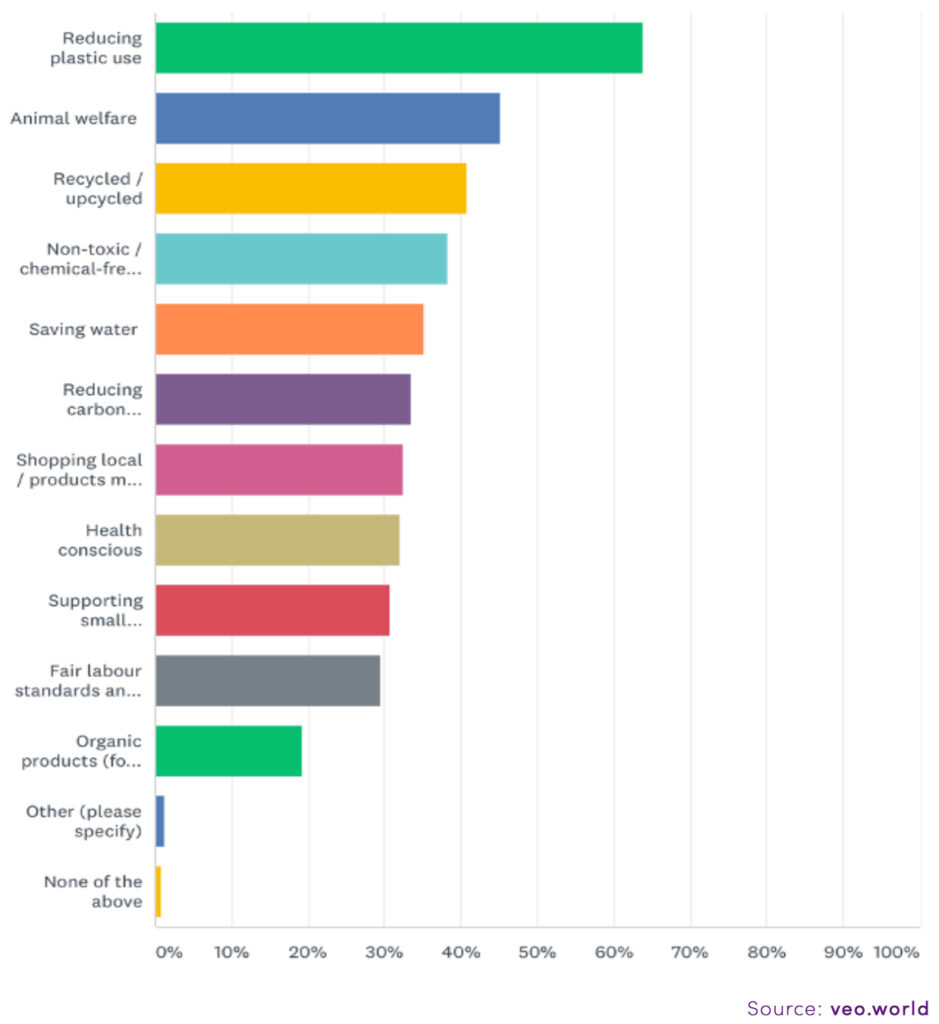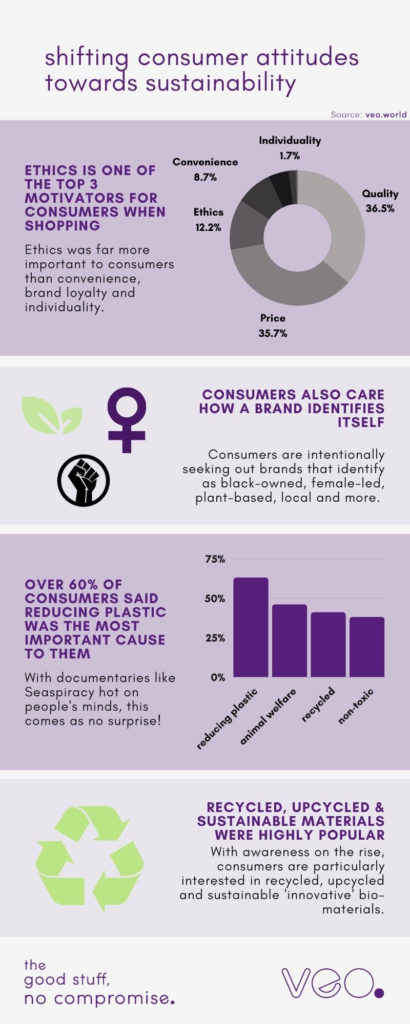We decided to find out for ourselves, with our new study that gives a whole new meaning to ‘retail therapy’
When 9 out of 10 consumers want to shop more sustainably, yet 8 out of 10 struggle to discover brands and products that live up to their ideals we knew we had to take action (from Deloitte, Sustainability). While we know there are plenty of passionate conscious consumers that are dedicated to the pursuit of a sustainable lifestyle, we wanted to know what the ‘general’ consumer thinks. According to Futerra, 88% of us want brands to step up on sustainable lifestyles. So as part of our mission to make ‘earth friendly‘ mainstream, we set out towards the end of 2020 on a research and study project to find out how to best deliver our mission.
Retail therapy is something many of us are very familiar with, yet whilst it is proven to help lift moods even well past the moment of purchase, it turns out we are becoming increasingly aware of the impact it is having and seeking ways to make our retail therapy more mindful.
Our research activities will continue indefinitely, as we engage with various partners, research bodies, and universities to build the data for us to continually improve our products and platform for our community (that’s you). We recently completed a research project, in collaboration with Code-switch Associate Research Consultants and several leading academic institutions (more details below), as a cross-generational study of 1,000 participants in 34 countries to investigate how consumers around the world were shopping, and exactly how consumers really feel about sustainability and the causes they care about most. Here’s what we found out!
What we found
For the average consumer, ethics was the most important factor after price and quality, scoring higher than convenience, brand loyalty, and individuality. This demonstrates that consumers are more likely to prioritise sustainability over more convenient alternatives on the high street if the perceived value is there. Here at Veo, we believe that sustainability and quality are intrinsically linked and that one shouldn’t exist without the other. That’s why we’re dedicated to ensuring our customers never have to compromise on their choices: the good stuff, no compromise.
Additionally, consumers were also motivated by how a brand identifies itself. For example, many participants stated that they intentionally seek to support diversity and positive social movements like companies that identify as black/BAME-owned, female-led, plant-based/vegan, independent, local and more. This reflects a wider demand for brands to reflect the same ideals as their customers. According to the 5WPR’s Consumer Culture Report, 83% of Millennials believe it is important for the brands they purchase from to align with their values. Our own findings were similar with the majority of consumers rating a brand’s ‘eco reputation’ as at least 7 out of 10 in terms of importance (see figure 2).

So consumers want brands that care about the causes that matter to them, but what causes do they care about most? Over 60% of consumers said reducing plastic waste was the most important cause to them when making a purchasing decision. With documentaries like Seaspiracy hot on people’s minds, this comes as no surprise! Animal welfare and recycling/upcycling were second and third with over 40%, followed by non-toxic/chemical-free with just under 40%. It’s clear from this that consumers care about a wide range of issues that pertain to sustainability from kindness to animals to environmental impact and general health. That’s why at Veo, we aren’t just focused on 1 single-issue campaign but holistically on 3 key pillars. We ensure that all the products on our platform are kind, healthy, and sustainable.
Over 60% of consumers said reducing plastic waste was the most important cause to them when making a purchasing decision. With documentaries like #Seaspiracy hot on people’s minds, this comes as no surprise! Click To Tweet
As awareness continues to grow regarding the environmental impacts of consumption, consumers are particularly interested in the materials used to make the products they purchase. Recycled/upcycled materials were highly popular along with an interest in bio-materials. This is something we champion here at Veo with brands such as Little by Little, who use recycled silver or ACBC that create sneakers from innovative materials derived from corn starch, apple skin, and more!
What do you think of the results? Tweet us @veo_world to share your views!
Pin It!
Veo study, March 2021:Study was delivered as part of Code-Switch’s Research Consultancy Programme: an interdisciplinary team of PhD researchers from academic institutions and partnerships across the UK, including the Universities of Exeter and Lancaster and with the participation of a researcher from Queen’s University Belfast. Researchers were funded by the ESRC NPIF Accelerating Business Collaborations fund and the Northern Bridge Consortium Doctoral Training Partnership.
